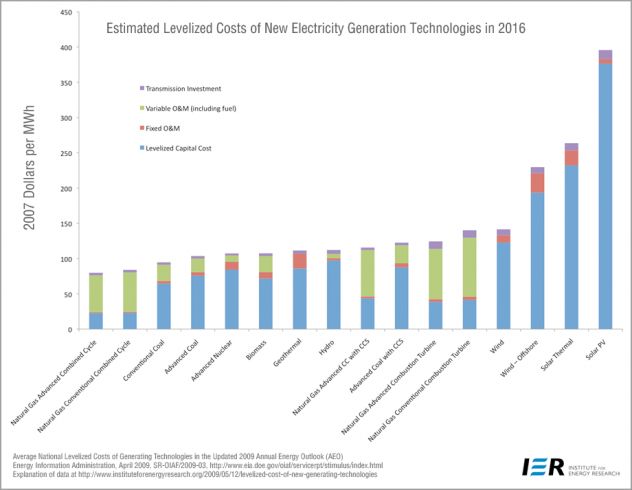Updated October 4 10pm PT
Sopogy, a designer of micro-concentrated solar power, is providing a solar thermal collector system for an air conditioning system at Masdar City, the low-carbon greentech cluster being imagined on the outskirts of the UAE capital Abu Dhabi.
Sopogy’s micro-CSP solar collector looks to produce the thermal energy to drive a 50-refrigeration-ton double-effect absorption chiller -- a technology widely used in many parts of the world for cooling from waste heat sources. The firm has a similar but smaller project in the works in its home state of Hawaii.
The question remains as to whether Masdar City is a viable project or the biggest slice of greenwashing the globe has ever witnessed. Brett Prior covered the slow progress on the massive project back in July.
Masdar means “the source” in Arabic.
-
Where Will DOE’s Loan Program Make the Next Climate Tech Investments?
48
-
What the Frack Is Happening With Natural Gas Prices?
15
-
With an Energy Crisis Brewing, No Peak in Sight for Emissions
9
We covered Sopogy in a recent article, detailed below.
***
Concentrated solar power (CSP) might conjure up images of massive solar collector installations in the California Mojave or North African desert with tens of thousands of mirrors or miles of parabolic troughs -- along with a lot of annoyed tortoises, politicians and environmentalists.
Sopogy's take on CSP is a bit different than that.
Smaller in size and operating at lower temperatures, the Sopogy design is CSP for the distribution grid or even the rooftop level. Smaller scale means one to twenty megawatts versus big CSP at 100 megawatts-plus, and lower temperature means 500 degrees F versus 800 degrees F. Those lower temperatures mean that the components can be a little more off-the-shelf and may reduce the need for expensive evacuated tubes and mirrors.
I spoke with Sopogy's CEO, Darren Kimura, in his headquarters on Oahu. Kimura founded the now 40-person firm in 2001 in Palo Alto, California and is a 19-year veteran of the energy industry, having already founded and sold an energy firm prior to his stint at Sopogy. The firm was originally funded by Kimura but has since taken about $20 million from investors including Cargill's VC arm, Black River Ventures, eBay founder Pierre Omidyar and TWC.
Sopogy is a parabolic trough design but the difference, according to the CEO, is this: "We are focused on reducing the cost by reducing the temperature." He added, "The sweet spot is 5 megawatts to 20 megawatts."
Large-scale CSP firms like BrightSource Energy are "dealing with significantly larger projects with steam at nuclear power plant temperatures." Sopogy's steam temperatures are more along the line of what a company like Ormat or Calpine would be encountering at a geothermal power plant.
Also like a geothermal power plant, the system uses an organic rankine cycle (ORC), which Kimura describes as akin to an air conditioner running backwards. The ORC enables a lower collector temperature, an improved efficiency and the possibility of reducing the size of the solar field. An ORC system uses the temperature difference between two liquids.
The MicroCSP of Sopogy also has the benefit of a thermal storage option. The storage fluid is a food-grade mineral oil stored in a container "like a big thermos." Additionally, the thermal inertia of the working fluid eliminates some of the intermittency faced by a photovoltaic panel installation.
In addition to Wholesale Distributed Generation (WDG), Kimura sees the the low-profile trough system potentially used on a flat roof in a city. The steam can be used to spin a small turbine or for Enhanced Oil Recovery (EOR), air conditioning, process heat or evaporative desalination.
The Sopogy system doesn't need high DNI (Direct Normal Irradiance) as the BrightSource Energy system does, according to Kimura. BrightSource needs 7 plus DNI but Sopogy can work at 5 DNI. That means Sopogy can and is installing systems in the Pacific Northwest, Idaho, the Middle East, Spain and Australia.
"We are competing against PV [and] we are cheaper than most PV," according to the CEO. Kimura said that the capex depends on the market and depends largely on the local labor costs since the system is built on-site. The projects can be installed for as little as $3 per watt, but in general, the cost is $5 per watt with an LCOE of about 20 cents per kilowatt-hour.
"We have about 75 megawatts under contract and in the process of being deployed," according to the CEO.
Other CSP players include Areva Solar, Abengoa (which is doing small scale CSP for air conditioning), BrightSource, eSolar, and SHEC. Michael Kanellos has written about next-generation solar thermal and molten salt storage, while Brett Prior writes about the economics of CSP here.

